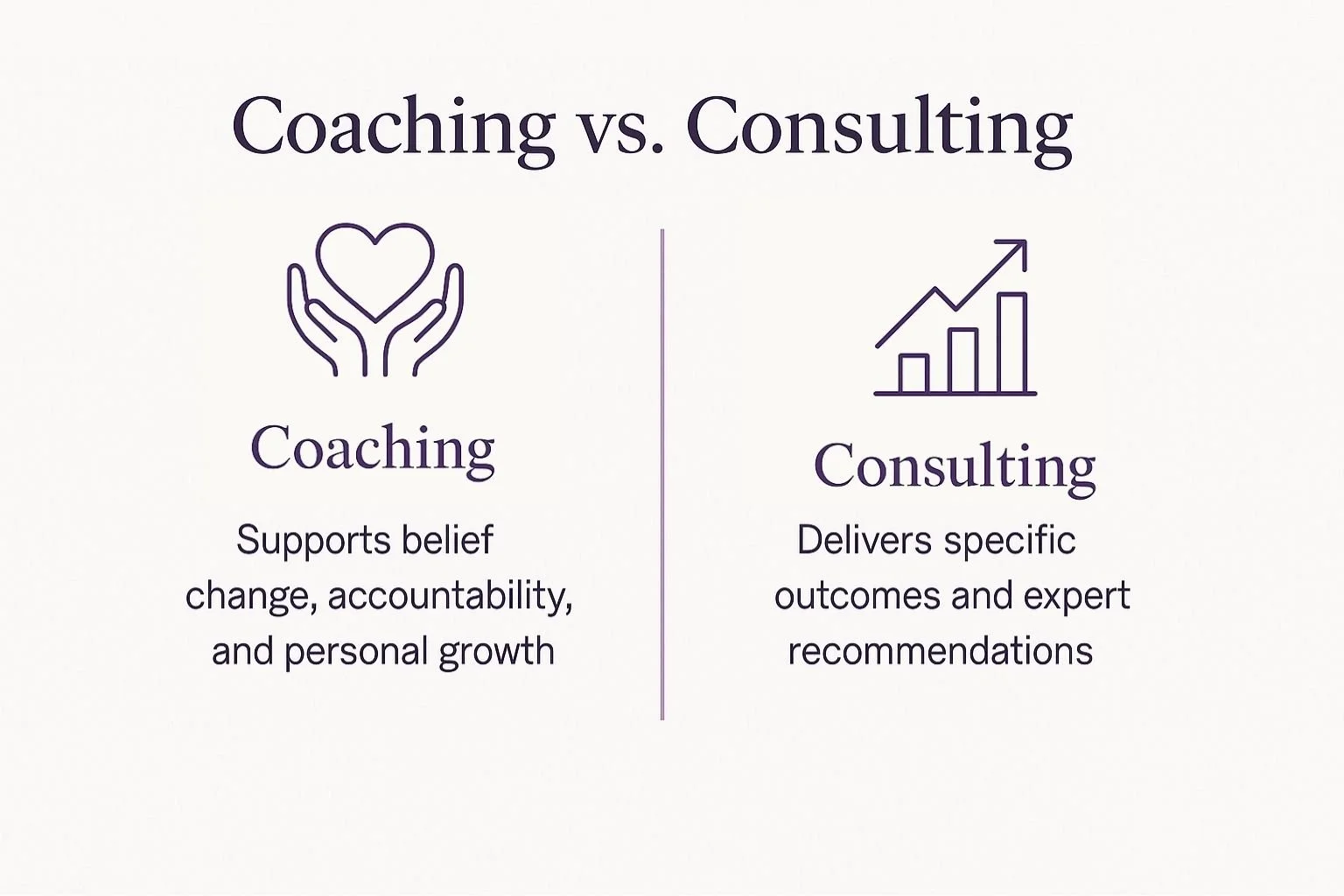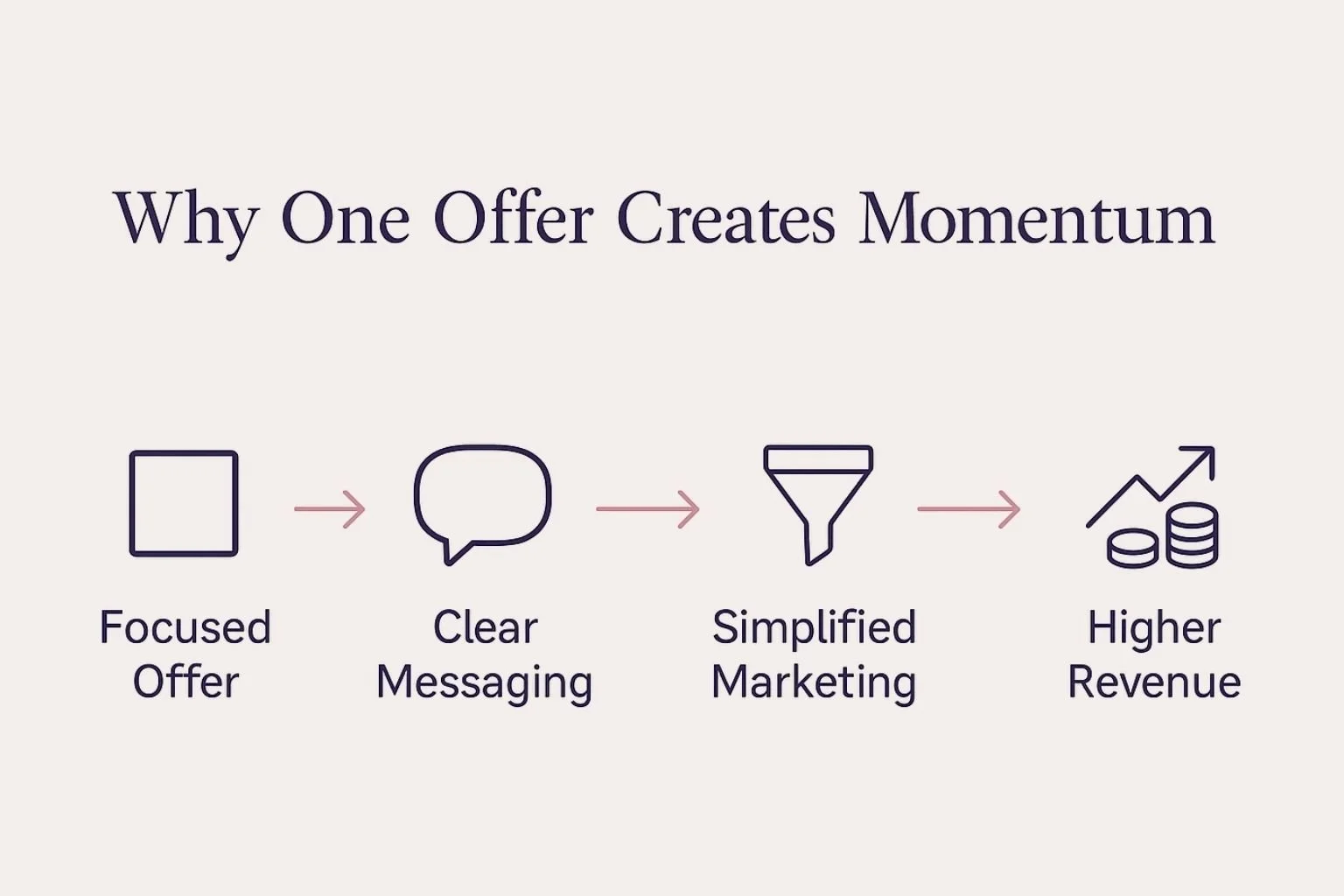From Coach to Consultant in 3 Simple Steps
You’ve built a business that helps people grow. Your clients trust you, your calendar is full, and you’ve worked hard to get here. But lately, something feels off. You’re booked solid, stretched thin, and it’s getting harder to command the rates you know you’re worth.
If you’ve started wondering whether this model is sustainable long term, you’re not alone.
There’s been a massive wave of new coaches entering the online space. And while you’ve done the work to establish credibility, the market is shifting and the value of emotional support alone isn’t landing the way it used to. That’s where consulting comes in.
Consulting isn’t about starting over. It’s about repositioning what you already know in a way that creates measurable outcomes and gives you back your time.
In this guide, I’ll walk you through exactly how to transition from coach to consultant without losing what makes your work meaningful. You’ll get a clear 3-step process to refine your offer, focus your energy, and show up as a respected expert.
Watch the video below to go deeper, or keep reading to get started.
Why So Many Coaches Are Ready for a Change
The online coaching space has exploded in the past few years. New programs, group offers, certifications, and business models seem to pop up every week. And while demand for personal growth is still strong, the market has become crowded and more competitive than ever.
If you’ve noticed that it’s getting harder to fill your spots, raise your rates, or stand out, it’s not your imagination.
Here’s what I hear from coaches every day:
Your calendar is maxed out, and every week feels like a sprint
You’ve hit a pricing ceiling, and pushing past it feels uncomfortable
You’re offering incredible transformation, but still trading hours for income
That’s not a failure. That’s a sign your business model needs to evolve.
The truth is, you don’t have to abandon everything you’ve built to create something more scalable and sustainable. You just need a new way to package your expertise. That’s where shifting from coach to consultant gives you the freedom to grow without burning out or starting from scratch.
Step 1: Reposition What You’re Selling
Before you can grow into consulting, you need to shift how you talk about the value you provide. Too many coaches stay stuck because they’re selling time, effort, or transformation without tying it to a tangible outcome. If you want to make the leap from coach to consultant, it starts by repackaging your offer around real, measurable business value.
Difference Between Coaching and Consulting: Mindset vs. Measurable Results
At its core, coaching supports behavior change. You're helping clients shift beliefs, build habits, and stay accountable over time. It’s valuable but the results are often unpredictable, and progress is hard to measure.
Consulting is outcome-based. Instead of guiding someone through internal change, you provide a plan. You diagnose the problem, map out a strategy, and tell them what to do. And because the result is tangible, clients are more willing to invest.
For example, I’ve worked with a retention consultant who helped membership businesses reduce churn. She wasn’t coaching anyone on mindset. She delivered a strategy, implemented a few changes, and helped clients increase profitability. That’s the power of consulting, it solves real problems with real solutions.
Sell Tangible Outcomes, Not Time or Support
When you package your work around results, your entire business shifts. Instead of charging for how much time you spend or how “transformational” the process feels, you charge based on the value of the outcome. That means higher pricing, fewer hours, and clients who are eager to implement not emotionally reliant on you for support.
This is where many coaches unlock scalable income for the first time. Once you're positioned as a consultant, you become a trusted expert not just a service provider.
Step 2: Choose One Offer and Go All In
If you’re trying to market coaching and consulting at the same time, or juggling multiple offers for different audiences, it’s probably wearing you out more than it’s working. And it’s one of the most common reasons coaches stall out when trying to transition into consulting.
You don’t need to do more. You need to do less, better. When you narrow your focus, your messaging gets sharper, your audience gets clearer, and your revenue grows faster.
Why Split Focus is Slowing Your Business Down
Trying to promote multiple services at once, especially when you’re still building momentum, spreads your energy thin. You end up running in five directions at once, saying yes to anything that pays, and wondering why your business isn’t scaling.
It’s not that you’re not good at what you do. It’s that your audience doesn’t know what you actually do. When someone lands on your page or hears your pitch, they’re confused—are you a coach? A consultant? A strategist? A course creator?
Confusion kills conversion. And often, the person most confused is you.
Why One Focused Offer Builds Confidence and Clarity
The fastest way to gain traction as a consultant is to pick one lane and go all in. That doesn’t mean you’re abandoning coaching forever. It just means you’re choosing to lead with the offer that has the most leverage right now and that offer is usually consulting.
I’ve had clients pause their group programs, cut their offer suite in half, or completely restructure their services and in nearly every case, revenue increased.
One student doubled her income in three months not by working more, but by simplifying her business and focusing fully on one consulting offer. That kind of growth happens when your audience knows exactly what you do and how you can help.
Clarity sells. Simplicity scales.
Step 3: Shift How You Position Yourself
Repositioning your offer is only half the equation. The other half? Repositioning yourself.
You can have a brilliant service and still struggle to sell it if you’re showing up like a helper instead of a strategic partner. Making the shift from coach to consultant means you stop centering the relationship and start centering the result.
This isn’t about ego. It’s about authority.
Consultants Are Trusted Experts, Not Emotional Support Providers
Coaches are often seen as guides, accountability partners, or even emotional lifelines. Clients come to you with uncertainty, indecision, and questions they’re not ready to answer. And over time, that dynamic can blur boundaries and burn you out.
Consultants are hired to solve a specific problem. Your value lies in your thinking, your process, and your insight, not in being available 24/7 or offering endless encouragement.
When you show up as a consultant, clients treat you differently. They expect clear recommendations. They respect your time. They’re more likely to implement what you say because they hired you to lead, not to hold their hand.
And here’s what’s even better: the clearer you are in how you show up, the more empowered your clients become.
Speak to Business Outcomes, Not Just Possibility
Most coaches sell possibility. They say things like, “Let me help you step into your potential.” It’s well-intentioned but vague. It puts the responsibility for change on the client, not the structure you provide.
Consultants speak in outcomes. They say, “I help online business owners increase retention by 25% in 90 days.” It’s direct, specific, and easy to say yes to.
This kind of positioning changes everything. Your messaging gets sharper. Your pricing becomes justifiable. Your calendar gets lighter and your revenue doesn’t suffer because of it.
You’re not leaving behind coaching. You’re leading with consulting. And when you do that, you move from being a support system to being the go-to expert clients trust to solve meaningful problems.
What’s Next: Is Consulting Right for You?
If you’re still reading, you’re probably already feeling it, that pull toward more freedom, more clarity, and more control over your time and income.
You’ve spent years helping others grow. But now it’s time to shift from being the one who supports everyone else to becoming the go-to expert people turn to for real solutions.
Here’s what we covered:
How to shift from selling transformation to delivering tangible outcomes and why that’s the key to commanding higher fees with less time in delivery
Why offering everything to everyone is slowing your growth, and how choosing one focused consulting offer can simplify your marketing (and double your revenue)
The importance of owning your expert status and positioning yourself as a problem-solver, not just a support system, so clients take action and respect your time
The transition from coach to consultant doesn’t mean letting go of your gifts. It means refining how you use them so you can work smarter, charge more, and finally scale with intention.
And if you’re ready to create a high-value consulting offer that actually works for your life, click the link below to join my Consulting Offer Accelerator and get the step-by-step framework to make it happen.
FAQ
-
Absolutely. In fact, many coaches already have the skills to be effective consultants, they just need to reposition how they package and deliver their expertise. If you’ve been helping people achieve transformation, you likely have insights, strategies, and frameworks that can drive tangible business outcomes. Making the shift from coach to consultant is often a matter of clarity, focus, and how you present your value.
-
It depends on your goals. Coaching focuses on emotional support and behavior change, which can be deeply meaningful but also time-consuming and unpredictable. Consulting centers on solving specific problems with clear outcomes, which typically allows for higher pricing, fewer hours, and more scalability. If you’re looking for a business model that protects your time while increasing your income, consulting may be the better fit.
-
The key difference is what you’re being hired for. A coach supports mindset shifts, accountability, and personal growth over time. A consultant provides a strategic plan to solve a defined problem and is valued for their expertise and recommendations. Coaches guide; consultants lead. And the path from coach to consultant often unlocks more clarity, confidence, and revenue.
-
Start by identifying what results you help people achieve and then decide how to position that outcome. If you want to do both, lead with your consulting offer and use coaching as a delivery method, not a standalone service. To make the transition easier, focus on one offer, one audience, and one clear result. Programs like the Consulting Offer Accelerator give you the framework to confidently shift into consulting without abandoning what you’ve already built.
Check Out More Posts Like This…
I’m Laura, a growth strategist and mentor to consultants.
As a serial entrepreneur who has scaled multiple six and seven-figure online and offline companies over the last twenty years, I can genuinely say that consulting is the best industry I’ve ever been in. Not only does it give me the freedom to spend time with my family and do the things I love (hello, tennis!), but working alongside world-changing entrepreneurs on their business strategies is one of the most rewarding roles I’ve had as an entrepreneur. This is a blog where I share my secrets of how to become an in-demand consultant.

















Learn a decision making framework to pre-commit priorities, set clear no criteria, and protect your time. Includes scripts and next steps.